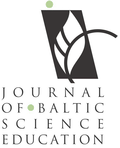EXPLANATIONS FOR PHYSICS PHENOMENA GIVEN BY PRIMARY SCHOOL WOULD-BE TEACHERS
| Title | EXPLANATIONS FOR PHYSICS PHENOMENA GIVEN BY PRIMARY SCHOOL WOULD-BE TEACHERS |
| Publication Type | Journal Article |
| Year of Publication | 2007 |
| Authors | Keinonen, T |
| Journal | Journal of Baltic Science Education |
| Volume | 6 |
| Issue | 1 |
| Start Page | 78-91 |
| Date Published | March/2007 |
| Type of Article | Original article |
| ISSN | 1648-3898 |
| Other Numbers | ICID: 482297 |
| Keywords | arguments, explanations, physics education, reasoning, teacher education |
| Abstract | A naturalistic case study on the way primary school would-be teachers explain physics was conducted in Science and Technology Education. The study dealt with explaining physics phenomena (mechanics, thermodynamics, optics and electricity) at the beginning and at the end of the course on physics. Although the students used everyday and scientific knowledge their explanations also offered mixed information that comprised both types. When using scientific knowledge the most advanced justifications were found in the issues concerning mechanics and electricity related phenomena. The students mainly used everyday expressions discussing the cases of light and heat. |
| URL | http://oaji.net/articles/2014/987-1404287134.pdf |
| Refereed Designation | Refereed |
| Full Text |
